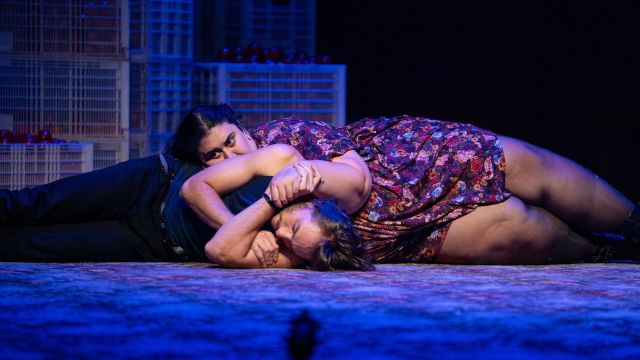Looking for Alibrandi
Vidya Rajan’s adaptation of Melina Marchetta’s novel fits snuggly into an even more multicultural Australia than Marcetta described in1992. Whilst it is retrospective, the story Marchetta tells is one that is still being experienced by girls – and boys – in families everywhere. Life is complex for young people, whatever their cultural or social background, and social media today adds complications that were never envisaged in the 1990s.
Marchetta’s heroine, Josie Alibrandi, is of Italian heritage, brought up by her Australian-born single mother who was estranged from her family when she fell pregnant as a teenager. Life hasn’t been easy – and Josie’s Italian grandmother doesn’t help especially with her stories about a family ‘curse’. As if Josie hasn’t enough to cope with, she’s in Year 12 at a strict Catholic school where class-based cliques, social politics and racism abound.
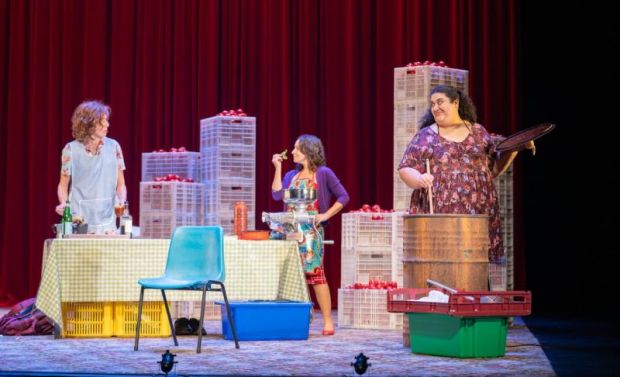
Rajan sticks closely to the original novel, where the annual Italian custom of making passata sets the story in its symbolic time and place. Nonna is in her element – and Josie and her mother Christina are there to help – surrounded by hundreds of tomatoes.
Designer Kate Davis has had fun creating this set. Boxes of tomatoes, stacked like high-rise city blocks surround the stage. They are framed by a high red curtain and carpet lit in red. At a table covered in a plastic cloth, tomatoes are prepared and tipped into a steaming drum. A press attached to the table is ready for the bottling.
Yet this isn’t the happy scene it should be. Rather it simmers with the tension of years – and director Stephen Nicolazzo keeps that tension bubbling strongly from the moment Josie enters the stage. Because Josie, played by Chanella Macri, isn’t the sort of person to calm things. She is smart, aware and direct and very protective of her mother.
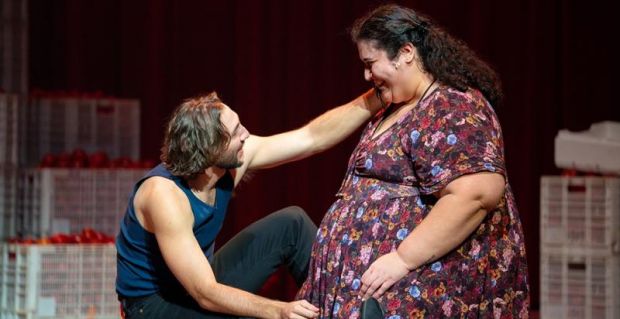
Macri makes her strong and feisty, defensive and articulate, using her expressive face to let the audience know clearly what she really thinks! Whether at her Nonna’s, at home or at school, Macri’s Josie is on the ball, ready to stand up for her mother and herself. She is a loyal friend – and a formidable enemy. But under the surface, she hurts for many reasons – and Macri shows this in moments of pain and indecision that are very moving and personal, especially with her mother – and the father who suddenly appears in her life.
Lucia Mastrantone plays her mother, Christina, whose resilience, strength and love have been Josie’s example and rock. Mastrantone is a consummate performer who shows a Christina who has had to fight for herself and Josie in very difficult emotional and financial times. She is a loving, caring mother – but a wary daughter, who has kept Josie’s father a secret from everybody for too many years.
Mastrantone also plays Sera, Josie’s special friend, the only other Italian girl in the school. As Sera she is quick and funny – a complete contrast to Josie’s more measured outlook on life.
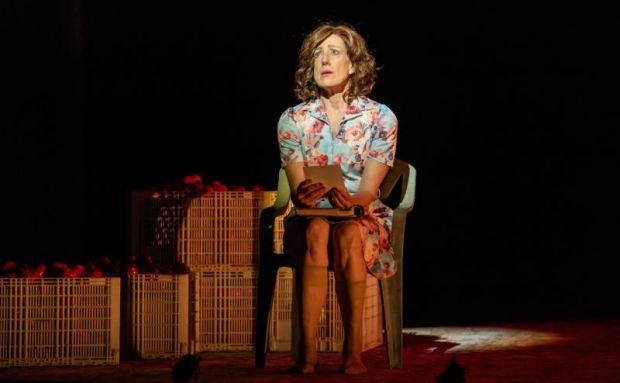
Nonna is played by Jennifer Vuletic who finds the strange intensity of this woman clinging to old customs with seemingly unreasonable strength. She treats Christina as a child and is overly protective of Josie – especially in the light of the ‘curse’ which she believes haunts the family. Vuletic makes Nonna prickly, restless, mooning over old photographs – and how she used to dance as a young girl before she came to Australia and the marriage that awaited her. It is not until she learns of Christna’s secret that she divulges her own – and the reason Christina’s father treated them both so harshly.
Vuletic also plays Sister Bernadett with appropriate righteous and moral fervour!
Ashton Malcolm also plays two roles. She is Ivy, the ‘goodie-goodie” snob who puts Josie and Sera down with degrading comments – and eventually a racist insult. Malcolm makes Ivy contained, arrogant and pretentious – totally different from John Barton, the private school boy she also plays.
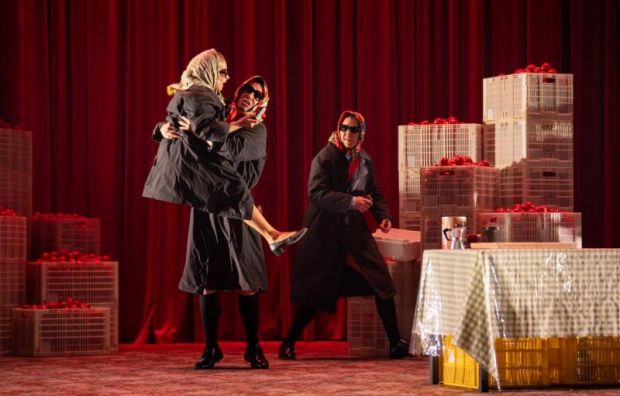
John is Josie’s friend. They share their thoughts and aspirations to study law – but John is dogged by his politician father’s high expectations to follow him into politics. Despite Josie’s faith in him, he is weighed down with a responsibility that he should not have to bear – and Manton shows the pressure of that weight becoming greater as the play proceeds.
Riley Warner, making his stage debut, plays Josie’s boyfriend, Scott. Scott is a charmer who likes cars and having fun – and Warner makes him easy-going, likeable, appealing but lacking in the ambition that Josie prompts him to have. Their on-stage relationship is sweet, both actors finding the beguiling innocence of fumbling young love.
Chris Asimos returns to the Riverside stage in the difficult role of Michael, Josie’s father, whose identity Christina has kept secret for so long. When he returns to Sydney from Adelaide as a lawyer and calls to visit Nonna, he meets Josie and Christina and things begin to fall into place. Josie’s life starts to change … as does Michael’s.
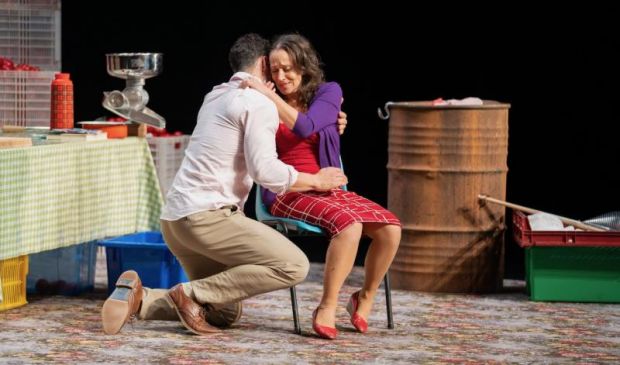
Asimos portrays that change very cleverly, gradually showing a developing sense of guilt that resolves into a sense of responsibility and eventually real affection for this bright, perceptive girl who mirrors his own intelligence and ambition and her mother’s caring and strength of spirit. He is diffident at first, accepting Christina’s initial rejection, then reaching out to her, gently winning her trust and affection as well as that of their daughter.
Looking for Alibrandi reaches across cultures and generations. It could be any family facing the effects of broken trust or religious or societal “lore”. The isolation, snobbery and racism could happen in any school – or workplace. The fact that situations like that can be faced, resolved and healed is at the heart of this funny, sad, heart-warming production which Stephen Nicolazzo directs with deft care and meticulous timing.
Carol Wimmer
Photographer: Matt Byrne
Subscribe to our E-Newsletter, buy our latest print edition or find a Performing Arts book at Book Nook.

